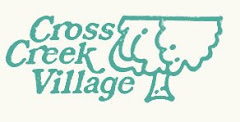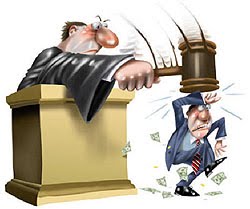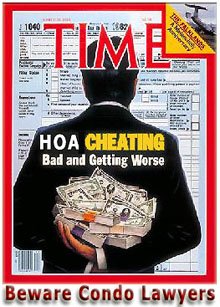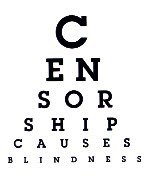 A Homeowners Association (“HOA”) has the power through the board of directors to enforce the governing documents, to make and enforce rules, and to levy fines and penalties against homeowners who do not comply. HOAs have been compared to municipal governments in both the duties owed to homeowners and the power to police homeowner conduct through the courts or through non-judicial methods.
A Homeowners Association (“HOA”) has the power through the board of directors to enforce the governing documents, to make and enforce rules, and to levy fines and penalties against homeowners who do not comply. HOAs have been compared to municipal governments in both the duties owed to homeowners and the power to police homeowner conduct through the courts or through non-judicial methods. While a 2007 National Survey by Zogby International reported that 72% of those interviewed had a positive experience living in a community association, this is little consolation for the homeowner who is faced with the threat of foreclosure for unknown charges on their dues statements, illegal assessments, unreasonable rules, or discriminatory conduct by the HOA. Owners may also encounter an HOA that fails to maintain the common areas, to prepare and distribute annual disclosures, to hold open meetings where homeowners can have their concerns addressed, or to respond to nuisance complaints or problems between homeowners.
The weight of the legal community is on the side of the HOA. Both the California Association of Community Managers (http://www.cacm.org/) and the Community Associations Institute (http://www.caionline.org/) make available to their members an extensive list of top shelf lawyers available to represent HOAs which are likely to have greater financial resources for attorneys' fees than do individual owners. Fortunately, if the homeowner prevails in an action against the HOA the homeowner’s attorneys' fees may be borne by the HOA.
There is an effort on many fronts to increase the regulation of HOAs. In July 2006, the AARP published “A Bill of Rights for Homeowners in Associations,” which advocated for fairness in litigation, and for the oversight of associations and directors. CAI responded that the AARP proposal would “increase costs to those who abide by the rules, yet benefit those who act against the common interest.” The California State Assembly has twice tried to enact a law which would create a Community Association Ombudsman who would assist community association homeowners. The legislation was vetoed both times by Governor Schwarzenegger, most recently at the end of last month.
Mandatory education for board members and an improved mechanism for settling complaints of homeowners against their HOA would benefit all homeowners. In a recent Colorado case, an HOA was ordered to pay $550,000 in attorneys' fees and related costs to a homeowner who asked the Booth Creek Townhouse Association to investigate moisture intrusion into his unit. The original repair would have cost about $5,000. If the HOA’s appeal of the attorneys' fees award fails, the homeowner members of the association will be responsible for paying the debt.
In a significant act, CAI filed a friend-of-the-court brief in support of the homeowner who was “forced to take several legal actions year after year for the sole purpose of forcing the association to honor its obligations and perform its duties….”
FBI Director Robert S. Mueller recently announced the inception of its Corporate Fraud Hotline as part of the national Corporate Fraud Initiative. This personally manned hotline will provide the general public with the opportunity to furnish information concerning suspected Corporate Fraud matters directly to the FBI in Washington, DC, via a tollfree telephone number, 888-622-0117.
CURBING HOA FRAUD: The FBI agents have asked that homeowners familiar with certain illegal practices of HOA lawyers and managers to send in their reports to their attention for referral to their superiors for investigations.
ANTI-HARASSMENT: If necessary, homeowners can also obtain restraining orders against unethical Lawyers and abusive Board Members who harass or discriminate against homeowners or violate homeowner's rights under FHA and and can refer unethical HOA lawyers to State BAR for disciplinary action such as suspensions and even disbarment.

















